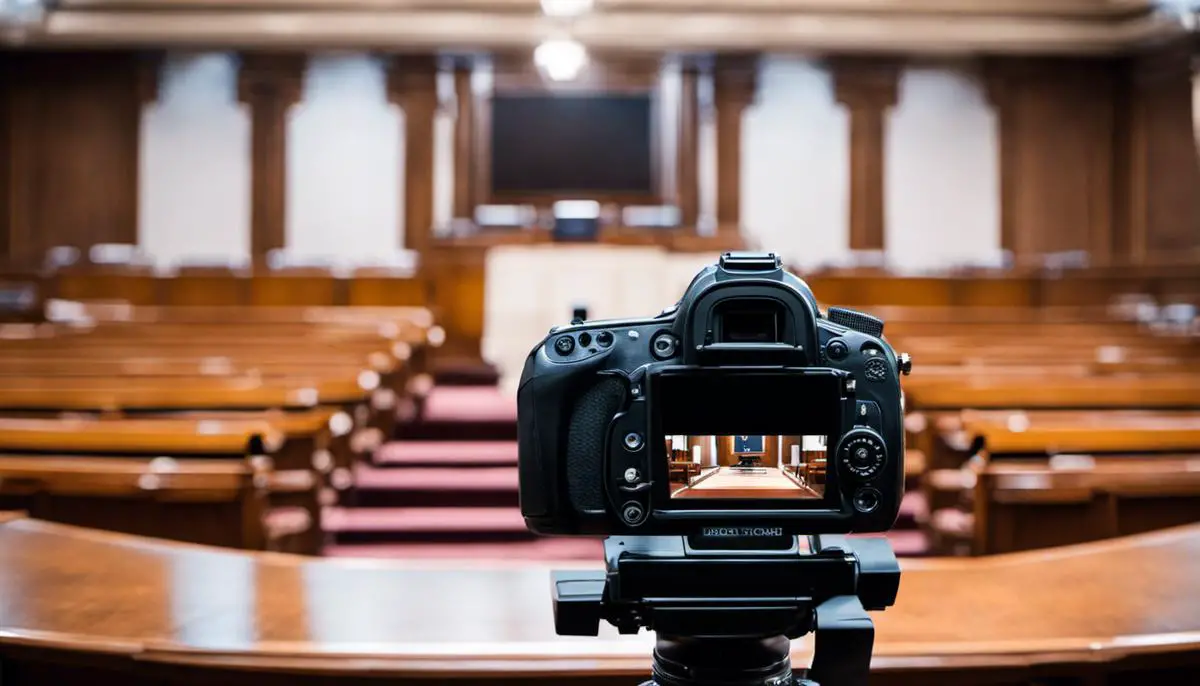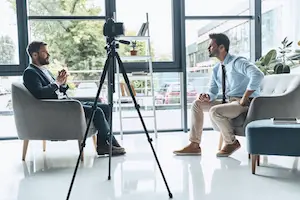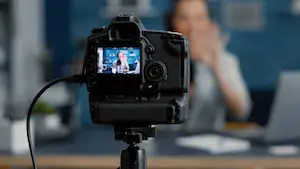
16 Nov Understanding Video Deposition of Expert Witnesses in Trials
The realm of law and justice is laden with numerous elements designed to ensure fair trials, and one such vital component is the video deposition. As we unravel the various complexities of a court trial, a key element that often stands out is the use of expert witness testimonies, increasingly captured through video depositions. This is an intricate yet indispensable process that entails capturing the expert’s testimony, typically in a pre-trial setting, as a way of preserving their input for the court. With a unique overarching role in shaping the direction of a case, understanding the concept, procedure, and effective utilization of video deposition of expert witnesses can enhance its value-add in the courtroom and potentially swing the verdict favorably.
The Concept and Importance of Video Deposition
Definition and Purpose of a Video Deposition
A video deposition of expert witnesses is commonly referred to as an expert witness deposition. This involves recording a witness’s sworn testimony outside of the courtroom, usually at an attorney’s office. The video deposition can be utilized during the trial when the expert witness is unable to attend personally due to distance or scheduling conflicts. The benefits of video depositions are manifold, including the potential to simplify highly technical information, humanize the expert witness to a jury, and provide the court with a clear, unambiguous record of the expert’s opinion.
The Process of Expert Witness Video Deposition
The deposition process commences with an attorney who asks the expert witness a series of questions about their credentials, observations, and opinions related to the case. The expert’s responses are then recorded and transcribed verbatim by a court reporter. A video deposition also involves audio and visual recording of the proceedings, providing a complete profile of the expert’s responses including their demeanor, tone, and non-verbal cues. On many occasions, the video deposition of expert witnesses can be more impactful than a written transcript, offering jurors real-time reflections of the expert’s credibility and competence.
The Impact of Expert Witness Depositions during Trials
Video deposition of expert witnesses plays a significant role in the legal process and the outcome of cases. In addition to clarifying intricate technicalities for the jury, an expert witness’s video deposition can reveal inconsistencies in testimony or bring out potential bias. This can subsequently influence a jury’s perception of the facts, the credibility of other witnesses, and the overall merits of the case. It is also possible to isolate particular portions of recorded testimony for playback, allowing jurors to consider crucial evidence in a direct, unfiltered manner.
Legal Requirement for Expert Witness Deposition
The legal expert’s deposition is typically conducted under the same rules as witness examinations in the court. The opposing lawyer is allowed to cross-examine the expert witness and challenge their qualifications and statements. The expert’s testimony and opinions must be based on their area of expertise and extend only as far as their professional knowledge, experience, and the evidence of the case permits. Consequently, an expert witness video deposition can result in the admissibility or inadmissibility of certain evidence based on the expert’s presentation and cross-examination responses.
The Rise and Importance of Video Depositions in Our Digital Age
As we progress further into the digital age, the use of video depositions in our courtrooms has become increasingly common. Their inherent convenience and efficiency make them a particularly valuable tool for transmitting expert testimony, especially when the expert is geographically distant from the trial location. Video technology has not only simplified the scheduling process and eliminated the need for travel, but it also affords us a dependable account of the witness’s spoken testimony. This innovative approach has played a crucial role in meeting the intricate and demanding requirements of contemporary litigation.
The Procedure of Video Deposition
Understanding the Video Deposition of Expert Witnesses
Video testimony from an expert, often referred to as an expert deposition, is a procedure involving a professional in a specific field who shares their knowledge and expertise in a testimony. This testimony is sworn under oath and recorded via video, making it eligible as potential evidence in a courtroom trial. The primary objective of an expert deposition is to supply the jury with comprehensive, clear, and credible facts and information, which they can consider during their deliberation process.
The Role of the Legal Team
The legal team usually includes the lawyer representing the plaintiff or defendant, and they play an integral role in the video deposition process. They orchestrate the deposition, designating which expert to depose and determining what questions to ask. The attorney will examine the expert witness, eliciting information relevant to the case. They can also cross-examine the expert to challenge their credibility or the validity of their opinions.
The Expert Witness
The expert witness could be an individual with specialized knowledge, training, or experience in a particular field. Their role in litigation is significant, given that they offer perspectives and explanations that go beyond common knowledge. These experts provide testimony that can help clarify complex issues, explain technical information, or establish standard industry practices, all of which can be crucial to the outcome of a case.
The Court Reporter
The court reporter is responsible for creating an accurate, verbatim record of the proceedings. Despite the video recording, a written transcript is often necessary for reference during trial preparations or in the courtroom. Court reporters use specialized equipment to capture every word, ensuring that the transcript is complete, precise, and readily understandable.
Rules and Regulations
The process of video depositions is strictly regulated by both federal and state rules of civil procedure. According to these rules, depositions should be taken in a fair manner, at a reasonable time and place. Furthermore, the use of video-recorded depositions must be disclosed beforehand, and everyone involved is required to provide truthful responses. It’s crucial that the expert witness understands that their testimony given during the deposition holds the same weight and significance as testimony given directly in the courtroom.
Introduction to Video Depositions
Video depositions, specifically those involving expert witnesses, are critical facets of legal proceedings. These pre-recorded testimonies cater to complex facets of a case, providing jurors with detailed information on specialized subjects. The effort necessitates cooperation between a legal team, an expert witness, and a court reporter while adhering to specific legal guidelines. This unique approach brings significant details to light, enhancing the juror’s comprehension of the matter on trial.
Using Video Deposition at Trial
Delving Deeper into Video Deposition of Expert Witnesses
Video deposition of an expert, otherwise referred to as an expert witness video deposition, encapsulates the expert’s sworn testimony recorded for court use. This usually takes place outside the courthouses, most times in an attorney’s office, and is conducted prior to the trial proper. Under oath, and in the presence of a legal representative, the expert is queried about their professional findings or viewpoints on the case at hand.
Admissibility of the Video Deposition in Court
The admissibility of an expert witness video deposition in court is directly linked to the rules of evidence and procedure. According to the Federal Rules of Civil Procedure, depositions can be used in court under various conditions such as the witness being unreachable, or to contradict or impeach the testimony of the deponent as a witness. However, the opposing counsel has the right to cross-examine the expert during the deposition, and if objections arise during the trial, the court can selectively admit parts of the video testimony.
Value Added to the Argument
Expert video depositions can greatly enhance the argument being presented in a trial. The primary advantage is that they enable the use of visual aids and explanations that can make complicated concepts easier for the jury to understand. The expert can visually elaborate on their testimony using diagrams, charts, or models, contributing to more persuasive arguments. Moreover, it allows the jurors to observe the expert’s demeanor, which can help to ascertain the credibility and trustworthiness of their testimony.
Navigating the Complexities of Video Depositions
Expert video depositions can serve as a potent instrument in the trial logistics, but they also bring issue complexities. Technical problems such as inadequate sound quality, improper camera angles, or insufficient lighting can directly affect how the testimony is received. Further, an element of subjectivity may be introduced due to jurors being influenced by the expert’s non-verbal cues and overall demeanor, which is not a risk within the written transcripts. Moreover, interruptions and objections during the deposition can disrupt the viewing experience for the jury. One must also take into account the substantial costs associated with creating a top-quality video deposition, including the expenses of a certified court reporter, a legal videographer, and potentially a fitting location for filming.
Tips for Effective Video Deposition Of Expert Wtinesses
The Concept of Video Deposition
Essentially, a video deposition consists of official remarks, recorded via video medium for use in legal proceedings and court presentations. Offering an amalgamation of auditory and visual aspects, this method has gained preference in many scenarios for its ability to provide jurors with a more explicit window into the deponent’s demeanor, body language, and tonal inflections. Such nuanced details offer jurors an empowering lens into the credibility and authenticity of the testimony, contributing to a well-informed judgment.
The Role of Expert Video Deposition
The role of video deposition of expert witnesses is a crucial piece of evidence in many legal actions – allowing the court to understand complex issues, processes, or procedures through the words of a specialist in the field pertinent to the case. The witness will provide detailed explanations and breakdowns of specialized information, making it accessible and understandable to the jury.
Best Practices for Video Deposition of Expert Witnesses
For producing an effective video deposition of expert witnesses, there are several crucial aspects to consider. From the side of the expert witness, they should ensure that they’re adequately prepared on the topic at hand. They should take time to review all relevant documents and materials and familiarize themselves with the details of the case. Clear, concise, and rich in information, delivery is key. So avoiding jargon or overly complicated language and explaining concepts simply yet thoroughly will be beneficial.
Legal Team’s Role
On the part of the legal team, careful preparation of their expert witness and meticulous crafting of questions is vital. The chosen expert should not only be knowledgeable on the topic but also a competent speaker, able to engage with the camera, and to present their statements in a manner that is easily understandable and honest in appearance. The legal team should practice the deposition with the expert, focusing not only on what to say but also on how to say it.
Preparing for Cross-Examination
Once experts are prepared, much attention needs to be given to anticipate cross-examination. The opposing side will be looking for weak points in the expert’s testimony, so being well-prepared for difficult questions is key. Practicing responses will make the expert more comfortable and prepared, reducing the chance of being caught off-guard by aggressive or tricky cross-examinations.
Technical Aspects of Filming Video Deposition of Expert Witnesses
A professionally filmed and edited video deposition of expert witnesses will add an element of professionalism and credibility. It’s important to consider quality audio and lighting, proper framing, a neutral background, and a distraction-free environment. The recording should typically include a date and time stamp, and any exhibits or diagrams the expert refers to should be clearly visible and discussed in detail.
The use of the expert video deposition at trial
The use of video deposition of expert witnesses at trial can give a significant edge to the presenting side, as the jury can get a clear understanding of complex information in a more engaging format. Therefore, each detail in production and presentation serves an important purpose and contributes to the impact it leaves on the court.
The insights gathered on the procedure, use, and essentials for an effective video deposition not only enable a comprehensive understanding of this legal phenomenon but also underscores its contribution to ensuring a fair trial. As this dialogue makes clear, an expert video deposition can indeed be the tipping point in a trial if used strategically by both the legal team and the expert witness. Mastering this procedure entails a comprehensive grasp of both the process and its effective execution. Ultimately, in the dynamic courtroom environment, the video deposition of expert witnesses stands as a robust tool for truth and justice, knitting together evidence, expertise, and emotion to draw the clearest picture for the jury.







